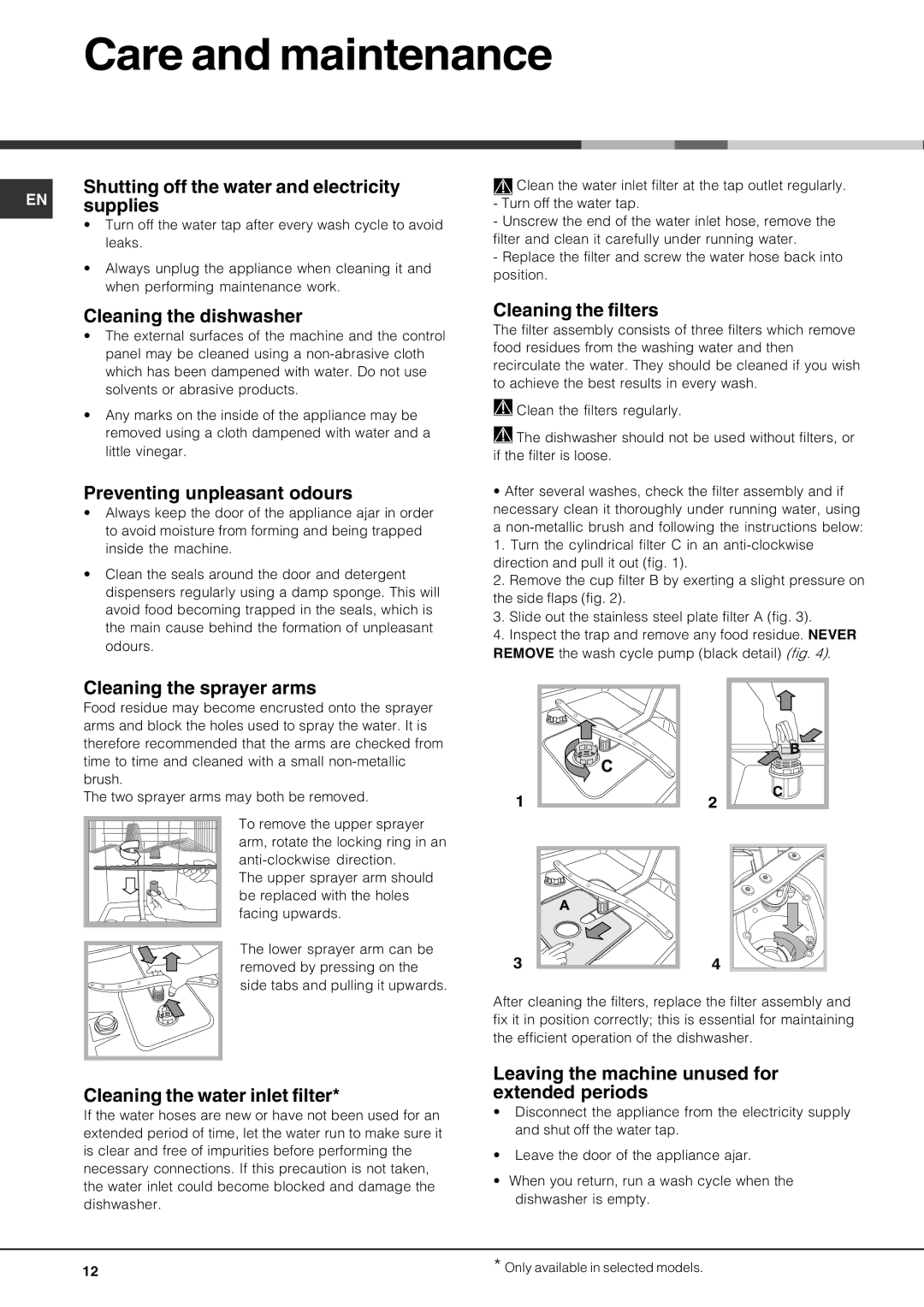
Care and maintenance
EN
Shutting off the water and electricity | |
supplies | |
• | Turn off the water tap after every wash cycle to avoid |
| leaks. |
• | Always unplug the appliance when cleaning it and |
| when performing maintenance work. |
Cleaning the dishwasher | |
• | The external surfaces of the machine and the control |
| panel may be cleaned using a |
| which has been dampened with water. Do not use |
| solvents or abrasive products. |
• | Any marks on the inside of the appliance may be |
| removed using a cloth dampened with water and a |
| little vinegar. |
![]() Clean the water inlet filter at the tap outlet regularly.
Clean the water inlet filter at the tap outlet regularly.
-Turn off the water tap.
-Unscrew the end of the water inlet hose, remove the filter and clean it carefully under running water.
-Replace the filter and screw the water hose back into position.
Cleaning the filters
The filter assembly consists of three filters which remove food residues from the washing water and then recirculate the water. They should be cleaned if you wish to achieve the best results in every wash.
![]() Clean the filters regularly.
Clean the filters regularly.
![]() The dishwasher should not be used without filters, or if the filter is loose.
The dishwasher should not be used without filters, or if the filter is loose.
Preventing unpleasant odours
•Always keep the door of the appliance ajar in order to avoid moisture from forming and being trapped inside the machine.
•Clean the seals around the door and detergent dispensers regularly using a damp sponge. This will avoid food becoming trapped in the seals, which is the main cause behind the formation of unpleasant odours.
•After several washes, check the filter assembly and if necessary clean it thoroughly under running water, using a
2. Remove the cup filter B by exerting a slight pressure on the side flaps (fig. 2).
3. Slide out the stainless steel plate filter A (fig. 3).
4. Inspect the trap and remove any food residue. NEVER REMOVE the wash cycle pump (black detail) (fig. 4).
Cleaning the sprayer arms |
|
| |
Food residue may become encrusted onto the sprayer |
|
| |
arms and block the holes used to spray the water. It is |
|
| |
therefore recommended that the arms are checked from |
| B | |
time to time and cleaned with a small |
| ||
|
| ||
brush. |
| C | |
The two sprayer arms may both be removed. | 1 | ||
2 | |||
| |||
To remove the upper sprayer |
|
| |
arm, rotate the locking ring in an |
|
| |
|
| ||
The upper sprayer arm should |
|
| |
be replaced with the holes |
|
| |
facing upwards. |
|
| |
The lower sprayer arm can be |
|
| |
removed by pressing on the | 3 | 4 | |
|
| ||
side tabs and pulling it upwards. |
|
| |
| After cleaning the filters, replace the filter assembly and | ||
| fix it in position correctly; this is essential for maintaining | ||
| the efficient operation of the dishwasher. | ||
| Leaving the machine unused for | ||
Cleaning the water inlet filter* | extended periods |
| |
If the water hoses are new or have not been used for an | • | Disconnect the appliance from the electricity supply | |
extended period of time, let the water run to make sure it |
| and shut off the water tap. | |
is clear and free of impurities before performing the | • Leave the door of the appliance ajar. | ||
| |||
necessary connections. If this precaution is not taken, | • | When you return, run a wash cycle when the | |
the water inlet could become blocked and damage the | |||
| dishwasher is empty. | ||
dishwasher. |
| ||
|
| ||
12 | * Only available in selected models. |
|
